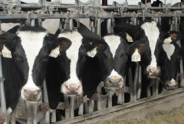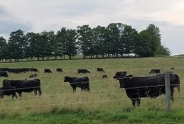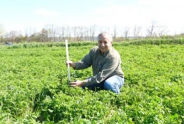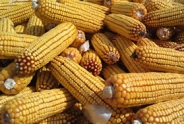Perspectives on the Opportunities and Impacts of Solar Installation in Agricultural Areas
Event Details
Date
September 28, 2023
October 12, 2023
October 26, 2023
November 9, 2023
November 22, 2023
Time
Noon - 1:15pm
Location
Zoom
Host
Cornell Cooperative Extension Herkimer County
Garet Livermore
315-866-7920
email Garet Livermore
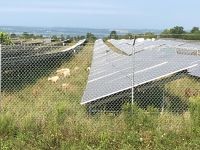
In a continued collaboration between Cornell Cooperative Extension, Pennsylvania, and Farm Bureaus of Ohio, Pennsylvania and New York this series of webinars will explore the continued push for development of solar energy projects in agricultural areas of the Northeast. This five part series will address the topic from multiple perspectives and help to identify the opportunities and challenges as well as currently know best practices for integrating the need for renewable energy with other economic and social factors.
Click on each session name to register. Register for one or all sessions in this series. All sessions are free.
Session #1: Impacts of Large-Scale Solar on Rural Communities - A Research Perspective
Thursday, September 28th 12 pm - 1:15 pm
Research into this topic is still relatively new; however, initial studies offer some insight into how the perceptions, impacts and opportunities around solar and land use. This session will explore current finding on key issues in rural communities, decision making metrics being developed through this research and how communities can integrate these metrics. Additionally, the potential tradeoffs between energy and agriculture and emerging opportunities in agrivoltaics will be discussed.
Session #2: Solar and Agriculture - A Company's Perspective on the Challenges and Pathways to Successful Integration of Both
Thursday, October 12th 12 pm - 1:15 pm
Developers of large-scale solar facilities are interested in optimizing the use of the land within the project footprint and continue to work to understand the opportunities and challenges of agrivoltaics, or dual use, setups. The session will also explore the key aspects of the decision-making process developers use for site selection and how they weigh these factors against impacts on land use, particularly when the location contains soil types identified as prime for agriculture production.
Moderator: Jeff Williams, NY Farm Bureau JWilliams@nyfb.org
Panelist:
- Marguerite Wells, Invenergy MWells@invenergyllc.com;
- Josh Bennett/Kevin Campbell, EDF Josh Bennett: Bennett@edf-re.com Kevin Campbell: Kevin.Campbell@edf-re.com
- Iain Ward, Solar Agricultural Services iain@solaragservices.com
Session #3: A Farmer's Perspective on Solar
Thursday, October 26th 12 pm - 1:15 pm
Farmers who have looked closely at solar electricity production on their land will discuss their experiences with developers, and their perceptions of the benefits and challenges of solar for agriculture. Discussion will include differences in the scale of solar projects, how solar might impact farmers in varied circumstances, and ideas for optimizing the benefits of a nd mitigating the challenges of solar for agriculture.
Session #4: A Community Perspective on Solar
Thursday, November 9th 12 pm - 1:15 pm
Expanding out beyond the impacts to individual landowners, solar develop can have broader opportunities and challenges for the rural, agricultural based communities that host them. This session will offer observations and ideas for the community level on best practices for successfully integrating solar as a land use. When it is a competing land use and when it can be a complementary land use.
Session #5: Question and Answer
Wednesday, November 22nd 12 pm - 1:15 pm
A Q&A to cover any and all of the previously presented material in Sessions 1-4 featuring the speakers from this series.
Upcoming Events
I Thought I Was Covered for That! - Farm Insurance Webinar Series
January 13, 2026
January 20, 2026
January 27, 2026
February 3, 2026
February 10, 2026
Free Webinar Series
Swine Production Zoom Series
February 5, 2026
February 19, 2026
March 5, 2026
March 19, 2026
April 2, 2026
Register for the whole series or for one or several sessions.
Pesticide Applicator Exam Prep Course
February 2, 2026 : Pesticide Applicator Exam Prep Course - Ballston Spa
Ballston Spa, NY
February 5, 2026 : Pesticide Applicator Exam Prep Course - Cobleskill
Cobleskill, NY
CANCELLED
February 6, 2026 : Pesticide Applicator Exam Prep Course - Herkimer
Herkimer, NY
February 9, 2026 : Pesticide Applicator Exam Prep Course - Morrisville
Morrisville, NY
February 13, 2026 : Pesticide Applicator Exam Prep Course - Norwich
Norwich , NY
Announcements
Statewide Field Crop Pathology Needs Assessment Survey
Your input is wanted for identifying priorities!Sign Up for Our Weekly E-Newsletter
We send out a bi-weekly e-newsletter that has announcements, upcoming programs, and opportunities for you! Registration is quick, easy, and free. Click here to sign up today!Farmers Can Join MeatSuite For Free!
MeatSuite.com is a free resource provided by Cornell University where NY meat farmers can create a farm profile and list their bulk (wholes, halves, quarters) and bundled (i.e. Grilling Bundle) meat products.Why should farmers join?
1. It's free and easy!
2. Connect with more local customers. In the past year the MeatSuite.com farm directory had 8,300 visits from New York consumers. Farm profiles get as many as 25 views per month from potential local customers. We also spotlight MeatSuite farms on social media and bring attention and purchases to farms through highlights and giveaways.
How do I join?
Farmers can visit https://www.meatsuite.com/farmers/ to create a free farm profile. You must list at least one product for your farm's profile to go live. You'll also have access to Cornell's free Meat Price Calculator, a helpful tool for pricing your meat to make a profit.
While you're on MeatSuite, check out the "Creating Consumer-Friendly Bulk Meats" publication on the log-in page. It has tips on how to create bulk meat products that are easier for first-time buyers to say "yes" to.
If you have any questions as you create your farm profile or products, we're here to help! Please email Matt LeRoux at mnl28@cornell.edu.

